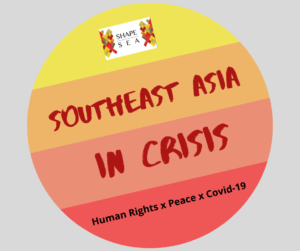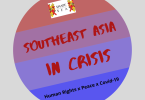Maya DaniaLecturer of International Development ProgramSchool of Social Innovation, Mae Fah Luang University, Chiang Rai – Thailand
 There is a locution accurately portraying what ASEAN member-states (AMS), under the Chairpersonship of Vietnam, are encountering at the moment: “living the year dangerouslyâ€, cited from an Italian phrase “vivere pericoloso†(Doran, 2020). This year is a “once-in-a-lifetime†period in the 21st century decades, when the COVID-19 forced everything and everyone to stop. No one saw the massive storm to economic and human crisis coming, although the domino effect reminded governments and people of the 1997 Tom Yum Goong crisis of Asian financial turmoil (Bangkok Post, 2017). As the Thai Baht devalued, thousands of businesses in the region were devastated in a long-term impact, causing a bloodbath in the stock markets and labor forces. Particularly in Indonesia, in 1998, the country was gradually falling into a multifaceted financial and political crisis, triggering the most traumatic riots and human rights violation along with distressing civil unrest in the country. Back then, the year of 1998 was, too, also, a “vivere pericoloso†for Vietnam in its first experience as the ASEAN Chair.In mid-July 1995, Vietnam became the seventh member of the Association of Southeast Asian Nations (ASEAN). For Vietnam, membership in ASEAN had pivotal political and security, economic, and social implications to increase cooperation with multiple players in a regional grouping. As the Communist Party of Vietnam (CPV) has adopted a resolution to have more friends and fewer enemies amid the Cold War (Chauhan, 2013), the country has been showing assiduous determination in cultivating the solidarity and unity in ASEAN, and also hard work to secure peace and reconciliation. During its early membership, Vietnam led efforts to bridge ASEAN country members with Indochinese bloc and emerged as one of the fastest-growing economies in the region, yet, leaving several notes in national and regional human rights and freedom unsettled. As such, up to the present day, as two thirds of the country’s total workforce are employed in the informal labor force, Vietnam is not party to the conventions protecting the rights of migrant workers and their families (Huong, 2019), and therefore, informal labors and migrant workers are not protected by laws and lack health insurance.As the Article 31 of the ASEAN Charter mandated rotation to ASEAN Chairpersonship, in the year 2020, Vietnam holds the third time of chair position after 1998 and 2010 (ASEAN, 2020). Reflecting from how Vietnam played out its chairmanship era, it is obvious that what is important for Vietnam is regional solidarity and centrality in engaging with external major powers. After the COVID-19 outbreak began, Vietnam hosted a virtual meeting in ASEAN Special Summit and ASEAN +3 Special Summit on COVID-19 response on the 14 April 2020, resulting in the adoption of Declaration of the Special Summit on COVID-19. As the main coordinator among ASEAN member states, Vietnam emphasized regional cooperation through measures such as an emergency response fund to combat public health crisis (ASEAN, 2020). Nevertheless, the Special Summit showed little attention to regional multilateralism as ASEAN member states continue to enforce measures against COVID-19 from their own national interest. Moreover, the call for a Special Summit is ‘a little too late’, especially to promote regional human rights and social protection to informal labors and migrant workers as a common priority, considering the regional COVID-19 cases have soared to more than 20,000 from merely hundreds and shut down people’s mobility across the region.COVID-19 bears an alarming resemblance to the Tom Yum Goong crisis. Few manufacturing industries in the countries will be immune to economic impacts (Williamson, et.al, 2020). The epidemic has hit ASEAN’s most dependent sector, the service and retail industries, where millions working in informal sectors lost their jobs and sources of income. Sending and receiving countries for ASEAN labors migration have also restricted workers’ mobility, engendering another immense wave of migrant crisis in the region. The shocks from the outbreak have been really appalling for ASEAN countries, making informal and migrant workers become the most vulnerable, if there is still no clear regulation on the protection of their rights, specifically social security and health.Amidst the pandemic epoch, the Tom Yum Goong crisis that once created year of “vivere pericoloso†was supposed to be a strong message for “an immediate†response for cohesive and responsive strategies for ASEAN to oversee the domino effects of a global crisis on an already fragile region. Yet, there has been no rights-based strategies to protect vulnerable populations, nor implementation of accessible public health to protect people across borders.References:ASEAN Organization. (2020). Declaration of the Special ASEAN Summit on Coronavirus Disease 2019 (COVID-19). Retrieved from: https://asean.org/declaration-special-asean-summit-coronavirus-disease-2019-covid-19/ASEAN Organization. (2020). ASEAN Chair. Retrieved from: https://asean.org/asean/asean-chair/Bangkok Post. (2017). 1997 meltdown ‘unheeded lesson’. Retrieved from: https://www.bangkokpost.com/thailand/general/1279751/1997-meltdown-unheeded-lessonChauhan, Sadhavi. (2013). Vietnam’s Role in ASEAN. Retrieved from: https://www.eastasiaforum.org/2013/10/23/vietnams-role-in-asean/Doran, Will. (2020). Indonesia and COVID-19: Living Dangerously Once Again . Retrieved from: https://thediplomat.com/2020/04/indonesia-and-covid-19-living-dangerously-once-again/Huong, Ngo. (2018). Vietnam (in Human Rights Outlook in Southeast Asia). SHAPE-SEA Secretariat (IHRP – Mahidol University)Truong, Mai. (2020). Vietnam’s Communist Party Finds a Silver Lining in COVID-19. Retrieved from: https://thediplomat.com/2020/03/vietnams-communist-party-finds-a-silver-lining-in-covid-19/Williamson, Chris. et. al. (2020). Economics & Country Risk Research & Analysis. Retrieved from: https://ihsmarkit.com/research-analysis/covid19-update-countries-industries-economic-impact.html
There is a locution accurately portraying what ASEAN member-states (AMS), under the Chairpersonship of Vietnam, are encountering at the moment: “living the year dangerouslyâ€, cited from an Italian phrase “vivere pericoloso†(Doran, 2020). This year is a “once-in-a-lifetime†period in the 21st century decades, when the COVID-19 forced everything and everyone to stop. No one saw the massive storm to economic and human crisis coming, although the domino effect reminded governments and people of the 1997 Tom Yum Goong crisis of Asian financial turmoil (Bangkok Post, 2017). As the Thai Baht devalued, thousands of businesses in the region were devastated in a long-term impact, causing a bloodbath in the stock markets and labor forces. Particularly in Indonesia, in 1998, the country was gradually falling into a multifaceted financial and political crisis, triggering the most traumatic riots and human rights violation along with distressing civil unrest in the country. Back then, the year of 1998 was, too, also, a “vivere pericoloso†for Vietnam in its first experience as the ASEAN Chair.In mid-July 1995, Vietnam became the seventh member of the Association of Southeast Asian Nations (ASEAN). For Vietnam, membership in ASEAN had pivotal political and security, economic, and social implications to increase cooperation with multiple players in a regional grouping. As the Communist Party of Vietnam (CPV) has adopted a resolution to have more friends and fewer enemies amid the Cold War (Chauhan, 2013), the country has been showing assiduous determination in cultivating the solidarity and unity in ASEAN, and also hard work to secure peace and reconciliation. During its early membership, Vietnam led efforts to bridge ASEAN country members with Indochinese bloc and emerged as one of the fastest-growing economies in the region, yet, leaving several notes in national and regional human rights and freedom unsettled. As such, up to the present day, as two thirds of the country’s total workforce are employed in the informal labor force, Vietnam is not party to the conventions protecting the rights of migrant workers and their families (Huong, 2019), and therefore, informal labors and migrant workers are not protected by laws and lack health insurance.As the Article 31 of the ASEAN Charter mandated rotation to ASEAN Chairpersonship, in the year 2020, Vietnam holds the third time of chair position after 1998 and 2010 (ASEAN, 2020). Reflecting from how Vietnam played out its chairmanship era, it is obvious that what is important for Vietnam is regional solidarity and centrality in engaging with external major powers. After the COVID-19 outbreak began, Vietnam hosted a virtual meeting in ASEAN Special Summit and ASEAN +3 Special Summit on COVID-19 response on the 14 April 2020, resulting in the adoption of Declaration of the Special Summit on COVID-19. As the main coordinator among ASEAN member states, Vietnam emphasized regional cooperation through measures such as an emergency response fund to combat public health crisis (ASEAN, 2020). Nevertheless, the Special Summit showed little attention to regional multilateralism as ASEAN member states continue to enforce measures against COVID-19 from their own national interest. Moreover, the call for a Special Summit is ‘a little too late’, especially to promote regional human rights and social protection to informal labors and migrant workers as a common priority, considering the regional COVID-19 cases have soared to more than 20,000 from merely hundreds and shut down people’s mobility across the region.COVID-19 bears an alarming resemblance to the Tom Yum Goong crisis. Few manufacturing industries in the countries will be immune to economic impacts (Williamson, et.al, 2020). The epidemic has hit ASEAN’s most dependent sector, the service and retail industries, where millions working in informal sectors lost their jobs and sources of income. Sending and receiving countries for ASEAN labors migration have also restricted workers’ mobility, engendering another immense wave of migrant crisis in the region. The shocks from the outbreak have been really appalling for ASEAN countries, making informal and migrant workers become the most vulnerable, if there is still no clear regulation on the protection of their rights, specifically social security and health.Amidst the pandemic epoch, the Tom Yum Goong crisis that once created year of “vivere pericoloso†was supposed to be a strong message for “an immediate†response for cohesive and responsive strategies for ASEAN to oversee the domino effects of a global crisis on an already fragile region. Yet, there has been no rights-based strategies to protect vulnerable populations, nor implementation of accessible public health to protect people across borders.References:ASEAN Organization. (2020). Declaration of the Special ASEAN Summit on Coronavirus Disease 2019 (COVID-19). Retrieved from: https://asean.org/declaration-special-asean-summit-coronavirus-disease-2019-covid-19/ASEAN Organization. (2020). ASEAN Chair. Retrieved from: https://asean.org/asean/asean-chair/Bangkok Post. (2017). 1997 meltdown ‘unheeded lesson’. Retrieved from: https://www.bangkokpost.com/thailand/general/1279751/1997-meltdown-unheeded-lessonChauhan, Sadhavi. (2013). Vietnam’s Role in ASEAN. Retrieved from: https://www.eastasiaforum.org/2013/10/23/vietnams-role-in-asean/Doran, Will. (2020). Indonesia and COVID-19: Living Dangerously Once Again . Retrieved from: https://thediplomat.com/2020/04/indonesia-and-covid-19-living-dangerously-once-again/Huong, Ngo. (2018). Vietnam (in Human Rights Outlook in Southeast Asia). SHAPE-SEA Secretariat (IHRP – Mahidol University)Truong, Mai. (2020). Vietnam’s Communist Party Finds a Silver Lining in COVID-19. Retrieved from: https://thediplomat.com/2020/03/vietnams-communist-party-finds-a-silver-lining-in-covid-19/Williamson, Chris. et. al. (2020). Economics & Country Risk Research & Analysis. Retrieved from: https://ihsmarkit.com/research-analysis/covid19-update-countries-industries-economic-impact.html





